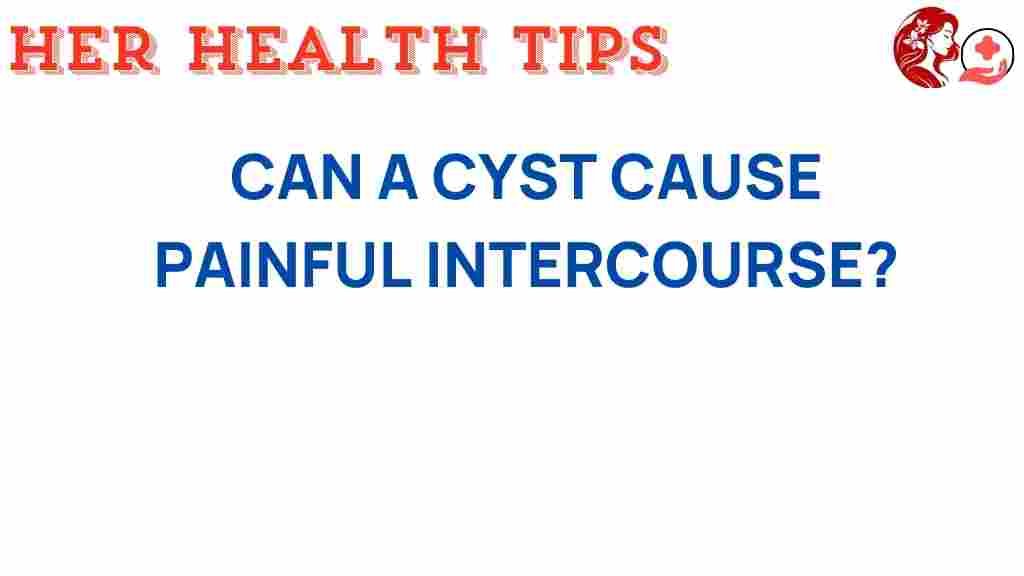Unraveling the Mystery: Can a Cyst Cause Painful Intercourse?
Painful intercourse, also known as dyspareunia, is a common issue that affects many women at some point in their lives. While there can be numerous causes of discomfort during intimacy, one potential culprit that often gets overlooked is the presence of a cyst. Understanding how cysts can contribute to painful intercourse is crucial for maintaining sexual health and overall reproductive health. In this article, we will explore the different types of cysts, their connection to pelvic pain, and how they may impact intimacy. We will also provide troubleshooting tips and guidance on when to seek medical advice.
What Are Cysts?
A cyst is a sac-like structure that can form in various parts of the body. They can be filled with fluid, gas, or semi-solid material. Cysts can occur due to a variety of factors, including infections, blockages in ducts, or even genetic conditions. In the context of women’s health, the most common types of cysts are:
- Ovarian Cysts: These are fluid-filled sacs that develop on the ovaries. They are often benign and may resolve on their own, but some can cause significant discomfort.
- Bartholin Gland Cysts: These occur when the Bartholin glands, located near the vaginal opening, become blocked, leading to swelling and pain.
- Follicular Cysts: These are formed when the follicle doesn’t release an egg during the menstrual cycle and continues to grow.
The Connection Between Cysts and Painful Intercourse
Understanding how cysts can lead to painful intercourse involves recognizing the symptoms they can cause. While not all cysts will result in discomfort, certain conditions can significantly impact sexual health:
- Pressure and Pain: Cysts, particularly ovarian and Bartholin gland cysts, can exert pressure on surrounding tissues, leading to discomfort during intimacy.
- Inflammation: Inflammation caused by a cyst can make the pelvic area sensitive, resulting in pain during sexual activity.
- Location: Depending on their location, cysts can interfere with the normal anatomy of the pelvic region, making penetration painful.
Identifying Symptoms of Cysts Related to Painful Intercourse
If you suspect that a cyst may be causing discomfort during intercourse, it is essential to recognize the symptoms associated with cysts. Common signs include:
- Pelvic pain or pressure
- Pain during ovulation
- Changes in menstrual cycle
- Swelling in the abdomen
- Pain in the lower back or thighs
- Increased pain during sexual activity
- Difficulty sitting comfortably
If you experience any of these symptoms, especially if they are persistent or worsening, it is important to seek medical advice from a healthcare professional.
Diagnosing Cysts
When visiting a healthcare provider for pelvic pain or discomfort during intercourse, they will likely conduct a thorough evaluation. This may include:
- Medical History: Discussing your symptoms, menstrual cycle, and sexual health history.
- Physical Examination: A pelvic exam may be performed to assess for any abnormalities.
- Imaging Tests: Ultrasounds or other imaging techniques can help visualize cysts and determine their size and location.
Troubleshooting Tips for Managing Discomfort
Here are some practical tips to help manage discomfort during intercourse if cysts are suspected:
- Communicate with Your Partner: Open communication about your discomfort can help both partners feel more comfortable and adjust accordingly.
- Use Lubrication: Applying a water-based lubricant can reduce friction and make intercourse more comfortable.
- Explore Different Positions: Some positions may put less pressure on sensitive areas. Experiment to find what feels best for you.
- Practice Relaxation Techniques: Stress and anxiety can exacerbate discomfort. Techniques such as deep breathing or gentle yoga may help.
- Schedule Regular Check-ups: Stay proactive about your reproductive health by visiting your healthcare provider for regular check-ups.
When to Seek Medical Attention
While some cysts do not require treatment, there are circumstances where immediate medical attention is necessary. You should contact a healthcare professional if you experience:
- Severe or worsening pelvic pain
- Fever or chills
- Unusual bleeding or discharge
- Nausea or vomiting
- Difficulty urinating or having bowel movements
These symptoms could indicate a more serious condition, and prompt medical evaluation is essential for your health.
Understanding Treatment Options
If a cyst is determined to be the source of your painful intercourse, various treatment options may be available:
- Watchful Waiting: Many cysts resolve on their own without treatment, so your doctor may recommend monitoring your symptoms.
- Medications: Over-the-counter pain relief such as ibuprofen or acetaminophen can help manage discomfort. Hormonal contraceptives may also be prescribed to regulate the menstrual cycle and prevent future cysts.
- Surgical Options: In cases where cysts are large, persistent, or causing significant pain, surgical intervention may be necessary to remove them.
It is essential to discuss all treatment options with your healthcare provider to determine the best course of action based on your individual circumstances.
Conclusion
In conclusion, cysts can indeed be a contributing factor to painful intercourse for many women. Understanding the relationship between cysts and pelvic pain is crucial for addressing discomfort during intimacy and maintaining sexual health. If you experience persistent pain during intercourse, do not hesitate to seek medical advice. Remember, open communication with your partner and proactive management of your reproductive health can enhance your intimacy and overall well-being. For further reading on women’s health issues, check out this resource.
By addressing any concerns with a healthcare professional and staying informed about your body, you can take significant steps toward a more comfortable and fulfilling sexual experience.
This article is in the category Reproductive and created by HerHealthTips Team
